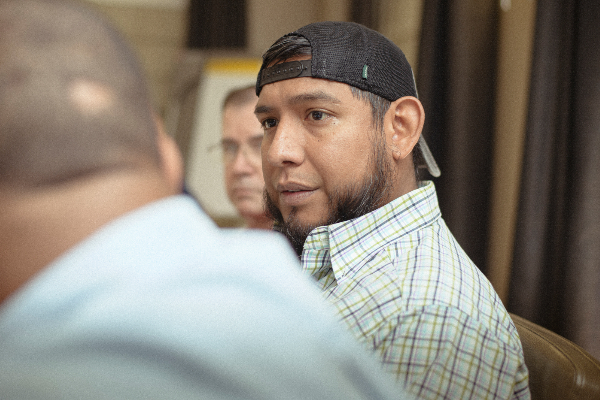Warrior Manages Sleep Issues with Help from Mental Health Program

In WWP’s Project Odyssey, warriors can address resilience and psychological well-being and increase their awareness of how sleep disruption — nightmares and insomnia — are influenced by PTSD and traumatic brain injury (TBI).
Army veteran Geneo Graves knows his sleep issues require more than a single solution.
His sleepless nights have multiple causes stemming from 30 years in the Army and eight combat tours, most of them with a Special Operations group. “I was more shut down than most, and there’s a lot of things I still cannot talk about,” Geneo said. “That’s my Achilles heel: to walk around with information I still cannot share.”
After going through multiple surgeries, sleeping on a recliner to relieve discomfort, and battling post-traumatic stress disorder (PTSD) and traumatic brain injury (TBI) among other health problems, he was getting by on three hours of sleep per night.
Through help from Wounded Warrior Project® (WWP) and its Project Odyssey® mental health program, however, Geneo has learned ways to combine the physical and mental health aspects of quieting the mind enough to get some rest.
Geneo notices improved resilience because his mind is not “running rampant with thoughts.” And while he is doing better than before, he still struggles at times. “Sometimes the gears are going; there’s no on and off switch.”
A Slow Awakening
At first, Geneo thought his symptoms were solely physical. He was not aware of his PTSD and how that affected his sleep. “I had to find out the hard way,” he said, recalling a mental breakdown.
Today, he is aware that managing sleep issues is a long-term, daily effort. “I still have sleep issues; they never go away completely.”
His sleep challenges improved, though, after Geneo participated in Project Odyssey, WWP’s 12-week mental health program that uses adventure-based learning to help warriors manage and overcome their invisible wounds and enhance resiliency. While participating in Project Odyssey, Geneo realized he was not the only one dealing with restless days and nights. Other veterans were struggling, too.
“When you’re around other people with similar problems, it becomes a little easier,” said Geneo. “Also, when you have programs that help you think differently about your problems, you realize that you can look at your situation from a different perspective.”
Geneo and the warriors he met at Project Odyssey are far from alone when it comes to sleep issues. According to a 2020 WWP survey of the wounded warriors it serves, 84% of warriors report having sleep problems.
And getting a good night’s sleep can be more challenging for veterans who deal with PTSD and mental health concerns. That’s why WWP helps warriors address sleep challenges from various angles, including both physical and mental health.
The Project Odyssey Approach
In WWP’s Project Odyssey, warriors can address resilience and psychological well-being and increase their awareness of how sleep disruption — nightmares and insomnia — are influenced by PTSD and traumatic brain injury (TBI).
“Unfortunately for many warriors, PTSD and TBI make daily routines more challenging and cause serious disruptions in their sleep quality,” said WWP Project Odyssey teammate Diane Neilson.
During Project Odyssey, warriors learn techniques to help regulate the nervous system, which controls emotional and behavioral responses to events. These techniques can include meditation or relaxation.
“When the nervous system is regulated, sleep is easier to achieve,” Diane said. “Every Project Odyssey experience is rooted in focusing on the present, learning to breathe properly, and establishing a community of support.”
The goal is to introduce a technique or skill that warriors can practice regularly after returning home that contributes to resilience and emotional regulation. As mental and physical resilience increases, the symptoms of PTSD tend to decrease, including sleep challenges.
Healing and Sleeping
Geneo now combines different approaches to manage his daily rest — including more exercise and time outdoors. “Each veteran is different,” Geneo said. “You have to select which tools are useful to your situation.”
His strategies include mindful eating, exercise, relaxation techniques, and mental health counseling. He begins with the simple stuff: “As far as practical tools, I do not have caffeine after 8 p.m.,” Geneo said. “I love sweet tea, and I kept having my tea late into the evening.”
Because exercise can help get the body ready for a good night’s rest, Geneo tries to incorporate physical activity in his daily routine. “When I go out for a walk, I get a three-for-one benefit: mindfulness, exercise, and peace. When you exert your body, you get both physical and mental advantages.”
During the second Project Odyssey he attended, Geneo served as a peer mentor to other veterans. He shared his personal experience and the tools he’s adopted to help with health challenges that affect sleep. He understands that even after successful intervention, warriors need steady encouragement after they return home. He makes himself available to talk with warriors and has walked other veterans through relapses and crises.
“It means a lot to be able to be a peer mentor,” Geneo said. “If I can save the life of just one of my brothers or sisters, that’s what’s important.”
Based on their unique needs, warriors can participate in all-male, all-female, or couples Project Odysseys. During the COVID-19 pandemic, WWP is offering Project Odyssey in-person and virtually to ensure warriors and their loved ones are most comfortable on their journeys to recovery. Learn more about Project Odyssey here.
Learn about the top health concerns of wounded warriors as reported in WWP’s 2020 Annual Warrior Survey.
About Wounded Warrior Project
Since 2003, Wounded Warrior Project® (WWP) has been meeting the growing needs of warriors, their families, and caregivers — helping them achieve their highest ambition. Learn more.